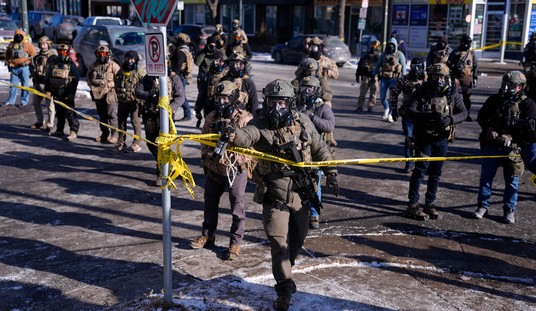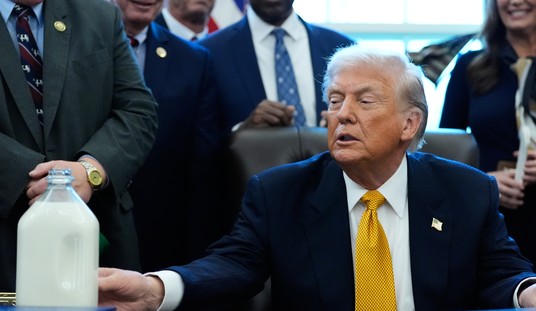We already got hints of this over the last couple of weeks, as Vatican officials spoke on the record in support of limited military action to rescue the Yazidis. The Boston Globe’s veteran Vaticanista John Allen noted the stunning change of tone from the previous two international forays into Iraq, but warned in an interview on The Ed Morrissey Show that it sounded more like a “yellow light” than a full-fledged endorsement of war. Allen also pointed out that it looked as though the Vatican was taking some care to separate Pope Francis himself from whatever endorsement of military action they were signaling.
Not any more, according to the Associated Press. This time the Pontiff himself has endorsed military action, but with at least one significant condition:
Pope Francis has endorsed the use of force in Iraq to stop Islamic militants from attacking religious minorities but says the international community — and not just one country — should decide how to intervene.
Reuters corroborates the AP report with some direct quotes from Francis about the legitimacy of force in stopping an unjust aggression:
“In these cases, where there is an unjust aggression I can only say that it is legitimate to stop the unjust aggressor,” he told reporters on the plane returning from South Korea in response to a question about U.S. air strikes against Islamic State insurgents who have overrun much of the country’s north. …
The pope suggested he was not giving a automatic green light for bombings or war but that the situation was grave and the international community had to respond together.
“I underscore the verb ‘to stop’. I am not saying ‘bomb’ or ‘make war’, but ‘stop him’. The means by which he can be stopped must be evaluated. Stopping the unjust aggressor is legitimate,” he said.
“One single nation cannot judge how he is to be stopped, how an unjust aggressor is to be stopped,” he said.
Francis seems to stop short of explicitly endorsing military force, but that’s only theoretically speaking. If anything short of military force could stop ISIS, Francis wouldn’t need to make this statement in the first place. The question will be — and actually is, in Francis’ statements — just what kind of force to apply.
In many wars, one can debate whether one side or the other, or both, have committed “unjust aggression.” In the case of ISIS, which is conducting genocides, ethno-religious cleansing, and wholesale massacres, as well as condemning women into sex slavery, there is no debate on the nature of the conflict. There is, however, debate on what it would take to put a stop to all of the above “unjust aggressions,” which is Francis’ first qualifier on his endorsement. According to the rough parameters of the just-war doctrine, there should be no more force than what is necessary to bring an end to the injustice being perpetrated. Pope Francis doesn’t want to offer any prescriptions for the specific methods but just the moral framework for the decision.
His other qualifier, which is that the debate should take place in an international context, may be easier to meet — as long as Pope Francis isn’t suggesting that the only legitimate body for the debate is the United Nations. NATO and the regional nations threatened by ISIS would provide for a rather robust international forum and avoid the traditional sticks-in-the-mud Russia and China. On the other hand, Russia and China might have their own reasons for backing the use of force; going after ISIS helps Bashar al-Assad and the mullahs in Tehran, at least in the short run.
This pronouncement will put significant pressure on the US and EU to take action in Iraq against ISIS, precisely because of the singular nature of a Catholic Pope endorsing any kind of military action in any context at all. Who wants to be seen as more pacifist than the Pontiff and finding their reluctance to act called out by any Pope as a moral failure by omission? That may be especially true with this particular Pope, who has tremendous international popularity and credibility as a moral voice in the modern age.
We’ll see whether this prompts the West into some coordinated effort to stop ISIS. In the meantime, make sure to bookmark this moment, because it won’t come again soon.
Update: Keeping in mind that the media is usually eager to slice up Pope Francis’ remarks, it’s a good idea to look for the larger context. T. Becket Adams has a longer piece of the remarks:
https://twitter.com/BecketAdams/status/501426536999038976/photo/1
In it, the Pope actually does specify that the proper venue should be the United Nations, plus he’s a little more careful than Reuters or the AP suggested in issuing an explicit endorsement of force. In this case, though, to ask the question is to beg the answer. “Is this an unjust aggression?” cannot be answered in any way other than yes, unless we want to suggest that genocides and sexual slavery are legitimate in some circumstances. “How should we stop it?” may be a little more nuanced, but there is no way to stop ISIS now without resorting to some kind of military force.
This is what the Vatican officials explicitly conceded on the record last week. Legitimizing an international debate on these questions married to an exhortation to stop the “unjust aggression” is a not-terribly-tacit green light for international action through the UN, if and when that body can agree to do something about it.
Update: CNN has a different take on the same remarks:
The Pope punted.
Asked if he approved of the American airstrikes that began earlier this month against Muslim militants in Iraq, Pope Francis held back his weighty moral imprimatur, refusing to support or denounce the military campaign.
“I can only say this: It is licit to stop the unjust aggressor,” the pontiff said Monday during a press conference on the plane back to Rome from South Korea. “I underline the verb: stop. I do not say bomb, make war, I say stop by some means.”
In an apparent reference to the United States, Francis said “one nation alone cannot judge” the best means of stopping “unjust aggressors” like ISIS, the group that calls itself the Islamic State. Those decisions should be made by the United Nations, the pontiff said.
“Punted”? Hardly. Pope Francis called for an international agreement to stop ISIS, preferably through the UN. His argument is that single nations can use claims of just war to oppress other nations, but (a) that’s clearly not the case with these limited airstrikes, and (b) Francis is supporting a “stop” on ISIS and its “unjust aggression” in some form. His answer is remarkably clear — he wants the UN to take responsibility for stopping unjust aggression and then get something done. In the meantime, people are dying, which is why the Vatican took the time last week to offer support for airstrikes to relieve the Yazidis and Christians in northern Iraq.







Join the conversation as a VIP Member